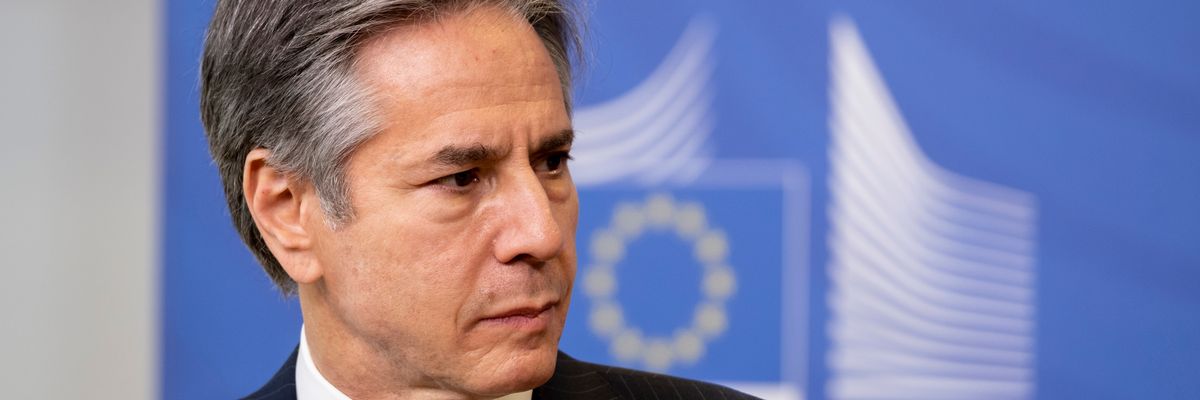If Secretary of State Antony Blinken’s Wednesday address in Washington is any indication, any hopes that the thousands of freshly dug graves across Ukraine and Russia might be giving rise to introspection or regret that diplomatic overtures could have staved off the war, are bound to be dashed.
In a speech titled, “The Power and Purpose of American Diplomacy in a New Era,” Blinken set forth a vision of U.S. foreign policy that is both exhaustingly familiar and deeply concerning because it indicates, at the very least, that our chief diplomat has very little understanding of what traditional diplomacy actually means. The sense one takes away from the speech is that Blinken believes it to be analogous to edict, fiat, and ukase.
Blinken’s conception of diplomacy does accurately reflect one thing: the Biden administration’s policy of waging a two-front cold war against the two principal authoritarian powers, China and Russia, as laid out in the 2022 National Security Strategy. Whether, by ratcheting up tensions with the two continental Eurasian powers, the policy has succeeded in making America and its allies in Europe and Asia safer, remains an open question.
Blinken, addressing (probably some) future members of the American (and international) foreign policy policy elite at the Johns Hopkins School of Advanced International Studies in Washington, noted that the students today are facing a vastly transformed international landscape than when he launched his own career at the dawn of the post Cold War era in the early 1990s.
The promise of that era has now passed. According to Blinken:
…Decades of relative geopolitical stability have given way to an intensifying competition with authoritarian powers, revisionist powers…Beijing and Moscow are working together to make the world safe for autocracy through their “no limits partnership.”
Today, he went on, far from the sunlit uplands of the Clinton era, we inhabit a world where “ democracies are under threat.” And the threat is twofold. Externally there is of course Russia and China. But there is a second threat. And that one is closer to home, one that is emerging “from the inside by elected leaders who exploit resentments and stoke fears; erode independent judiciaries and the media; enrich cronies; crack down on civil society and political opposition.”
Reading Secretary Blinken’s speech, it is hard to believe that there was a time, within Blinken’s lifetime even, that Democrats like President John F. Kennedy counseled cooperation, even dialogue and empathy, when turning to deal with one’s adversaries. It is indeed, given the party’s transformation in recent years, difficult to contemplate there was once a president who asked us to temper our self-regard, cautioning that “no government or social system is so evil that its people must be considered as lacking in virtue.”
But no more. Antony Blinken has seen the enemy and it is us (and the Russians and the Chinese, and probably the Hungarians and most definitely the North Koreans, and if they keep heading down the ‘wrong’ path, Poland might get thrown into the mix, but not yet, not with the war still on.)
What to do? The answer is simplicity itself: Permanent vigilance in the service of the “international order.” For when “the Beijings and Moscows of the world try to rewrite – or rip down – the pillars of the multilateral system; when they falsely claim that the order exists merely to advance the interests of the West at the expense of the rest – a growing global chorus of nations and people will say, and stand up to say: No, the system you are trying to change is our system; it serves our interests.”
Sentiments such as these aren’t necessarily alarming if they’re uttered (and they are) by the kind of students in the audience at SAIS today — after all, they’re young and idealistic. What’s frightening is that they were uttered without irony by the nation’s chief diplomat — even if he is a product, as this one is, of both Harvard and Marty Peretz’s New Republic.
The bigger problem with Blinken’s address, aside from it being both astoundingly naive and self-serving, is that is reveals a mindset unalterably opposed to the practice of actual diplomacy which in turn has led to a disdain both for negotiations and for the concepts of national interests, reciprocity and empathy — all of which had been used to keep the peace between the U.S. and the Soviet Union during the first Cold War.
Blithely ripping up that playbook in favor of a maximalist doctrine that seeks to confine into permanent obloquy states that view their own interests differently from those of Washington would seem a mistake.
But it's a mistake diplomats from both parties seem intent on making.
- Thanks to Biden, the War Party is back ›
- Biden official admits US refused to address Ukraine and NATO before Russian invasion ›
- Blinken goes to China to maintain the illusion of stability | Responsible Statecraft ›
- Blinken rocks out on a road to nowhere | Responsible Statecraft ›
















